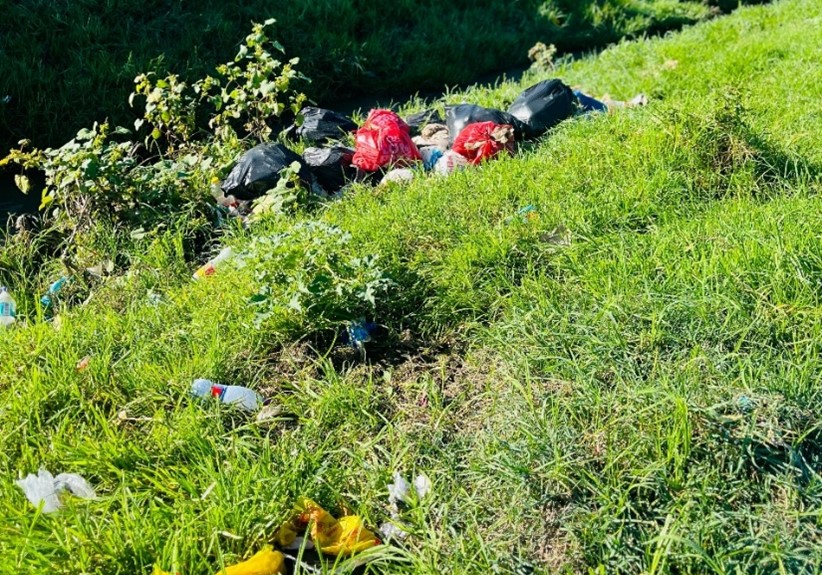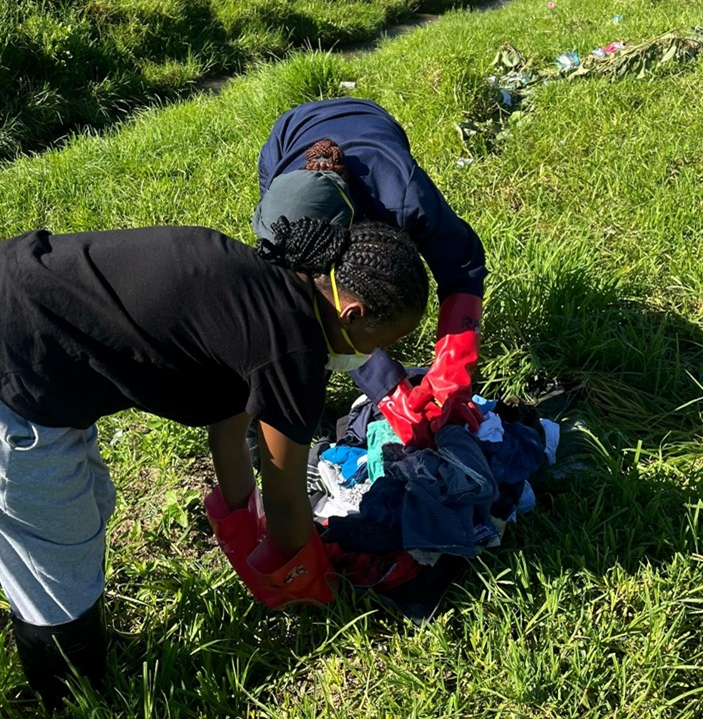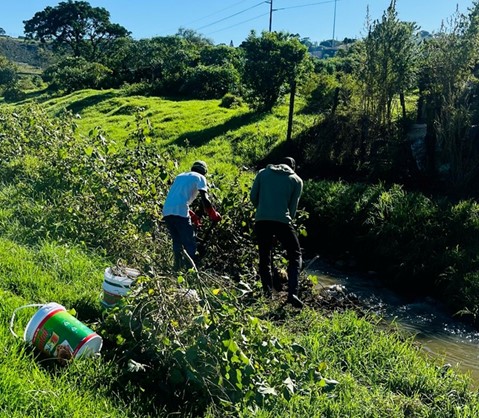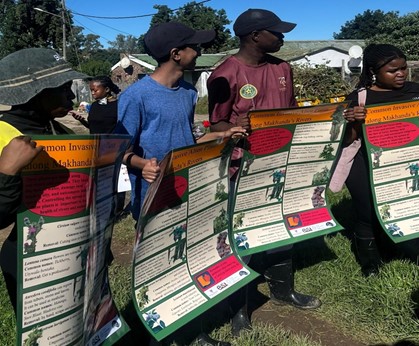27
JUNE, 2025
By: Aleesha Padayachee, Tshepang Tlali, Mawande Qwabe, Sbongisipho Mthethwa from the Honours class, Department of Environmental Science, Rhodes University
On Saturday, the 26th of April 2025, the Rhodes University Environmental Science Honours class returned to the Matyana River at Scott’s Farm for the second time this year for yet another river clean-up. The weather was on our side, warm yet not scorching hot, with a breeze that was light enough to keep the energies high and the sweat low. The most heartwarming part of this clean-up was not the sunshine or the skip that we could fill in record time, but it was the kids, with their familiar faces, eager hands and bright smiles.
Usually, the kids will see Helen’s car and know it is River Rescue time, but this time around, Mlibo, Lwandile and Tshepi walked around house to house asking the parents if their kids could join the clean-up. Some kids remembered us from our last visit and could call some class members by their names. With bright smiles, they rolled up their sleeves and joined the class in the clean-up. Together, we hauled plastic, dirty diapers, wet clothes, and all sorts of unexpected waste out of the river and the riverbanks. Their enthusiasm reminded us that these clean-ups are more than environmental interventions, they are also moments of connection, learning, and community-building.

Figure 1: Different types of waste found on the riverbanks
We were honoured with visits from Helen Holleman, the founder of River Rescue, and our course coordinator, Dr Jessica Cockburn, who both stopped by to show their support. Helen brought apples for the kids and educational posters for them to take back to their respective schools, informing them about the different types of invasive species found along the rivers in Makhanda. Bronwyn, a student from the Rhodes University Geography Department, also joined us, lending an extra helping hand. Their presence reminded us that the clean-ups are part of a wider network of care and commitment to change.
What happened down by the river?
The Matyana River at Scott’s Farm runs through a complex and struggling neighbourhood where municipal neglect (including insufficient waste removal services) has become the norm. This has resulted in the river becoming a dumping site for community members, with dumped diapers, clothes, all kinds of plastic and other debris.

Figure 2: Members of the class pulling out discarded clothes from the riverbank

Figure 3: Members of the class grappling with pesky invasive plants on the riverbank
Divided into squads, Zipho, Tshedza, Siviwe, and Mlibo fought with the invasive plants. On the other hand, Ethan, Luyanda, Sbonga, Tshepi, Lihle, Aleesha, Bridgette, Mawande, Lwandile, Bronwyn, and the kids filled the buckets with waste, plastic, diapers, clothes and all sorts of dirt found along the riverbanks. The real VIPs, though, were the kids, with bright eyes, curious questions and many stories about the activities along the river. While filling the buckets, some of the kids filled the space with some of their stories, although most came from a concerned kid. “You know, some of the people wash their hands in this dirty river, and some of the kids even swim in this river; I can see them playing from my house, but I have learned that the water from the river is not good for us”. These interactions were meaningful as they showed us that kids are paying attention, and with the right encouragement, they can become powerful allies in environmental stewardship.

Figure 4: Members of the class emptying their buckets of waste into the skip
After filling the skip, we took a small break from hauling trash and turned our attention back to what matters most: the kids. We gathered the kids and Lwandile and Tshepi explained to the kids what we were doing and why it mattered. Their curiosity was palpable. We did not just talk about litter and pollution; we also introduced invasive species to the kids and how these plants can throw ecosystems off balance. And guess what? When we asked if the kids had seen any of the invasive plants, every single one of them could point out examples from their surroundings, while some kids even brought us samples like they were on a mini scavenger hunt!

Figure 5: Members of the class teaching the kids about the different invasive species
So what? From theory to tired muscles
We have read about social-ecological systems and sat through classes on feedback loops, resilience and systems thinking. However, at Scott’s Farm, we felt it. The river is not dirty because people do not care but because it has been caught in a loop. Poor municipal services have left the community with fewer disposal options, leading to the riverbanks becoming dumping sites. The pollution not only degrades the ecosystem but also enables invasives to thrive, and the worse it gets, the harder it becomes to reverse the damage. Suddenly, our systems thinking, adaptive cycles, and transformation coursework did not feel so abstract because we were not just observing a system; we were in it, trying to shift it, even if only by a degree.
Now what? The future of River Rescue, Scott’s Farm and ours
We left Scott’s Farm with tired backs, stained gloves, and a sense of direction. Community clean-ups are not just about aesthetics but equity, access, and environmental stewardship. We learned that one morning makes a visible difference, but long-term transformation needs more than a few students with garbage bags. We propose that River Rescue and others focus not only on clean-ups but also on consistent education and collaboration with community leaders. What if the kids we met became the next river guardians? What if we partnered with local schools to turn environmental awareness into a curriculum and inspire kids to become environmental scientists and change makers?
As for us? We will keep showing up, maybe not always with gloves, but always with intention. We are researchers, policymakers, and scientists in training, and we now understand that data does not change systems, but people do!
“Stay green. Stay curious. Stay compassionate.”
